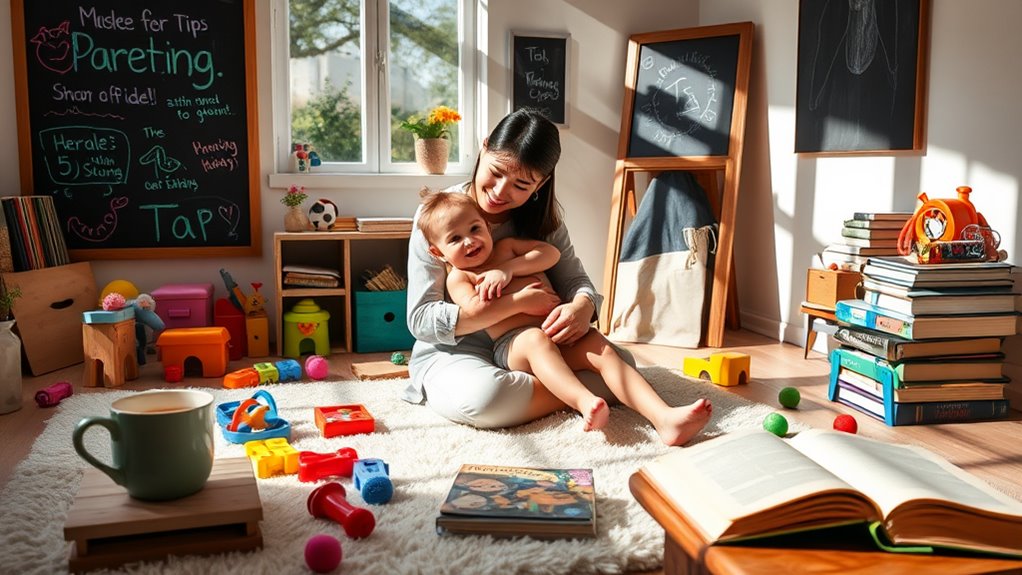10 Secrets Every Parent Needs to Know About Raising Happy Kids!
Raising happy kids requires understanding their emotions, encouraging open communication, and fostering independence. You can start by expanding their emotional vocabulary and having regular feelings check-ins to validate their experiences. Create a supportive environment where they feel safe to express themselves. Use positive reinforcement to celebrate their efforts and achievements, helping them develop a growth mindset. Encourage social connections by facilitating friendships and community interactions. Practicing gratitude and kindness will enhance their emotional resilience and social well-being. By implementing these strategies, you’ll set your children on a path to happiness and fulfillment. Discover the other secrets that can further enrich their lives.
Key Takeaways
- Foster emotional intelligence by expanding emotional vocabulary and encouraging open discussions about feelings to build resilience in children.
- Create safe spaces for expression, using active listening techniques to validate emotions and strengthen family bonds.
- Establish routines and responsibilities, allowing children to make decisions and learn self-sufficiency through age-appropriate chores.
- Emphasize kindness and community service, teaching children the value of empathy and connection with others.
- Regularly practice gratitude as a family to enhance emotional resilience and promote a positive mindset.
Understanding Your Child’s Emotions
Understanding your child’s emotions is crucial for fostering a supportive environment where they can thrive. To effectively nurture their emotional intelligence, start by expanding their emotional vocabulary. Teach them to recognize feelings—both their own and those of others. This foundational skill enhances empathy development, allowing your child to relate to peers more deeply.
Implement mood tracking through simple charts or journals, encouraging your child to monitor their emotions daily. This practice not only heightens awareness but also supports emotional regulation, helping them identify triggers and patterns. When your child encounters strong feelings, guide them in employing coping strategies—like deep breathing or creative expression techniques—to manage these emotions constructively.
Regular feelings check-ins can promote emotional validation, making your child feel heard and understood. Use open-ended questions to facilitate discussions about their feelings, reinforcing that all emotions are valid. As you nurture these skills, you equip your child with vital tools for navigating life’s challenges. Ultimately, fostering a rich emotional landscape will empower them to express feelings openly and develop resilience, setting the stage for a happy and fulfilling life.
Encouraging Open Communication
To raise happy kids, you need to create an environment where open communication thrives. By practicing active listening techniques, establishing safe spaces for expression, and holding regular family check-ins, you can foster trust and connection. These strategies not only help your child feel heard but also encourage them to share their thoughts and feelings more freely.
Active Listening Techniques
Active listening is a powerful tool that can transform your conversations with your kids, creating a safe space for them to express their thoughts and feelings. This technique involves not just hearing words but also understanding the emotions behind them. By focusing on nonverbal cues—like facial expressions and body language—you can gain deeper insights into your child’s feelings.
To practice reflective listening, repeat back what your child has said in your own words. This shows them you’re engaged and helps clarify any misunderstandings. For instance, if your child shares a concern about school, you might say, “It sounds like you’re feeling overwhelmed with your homework.” This validation encourages them to share more and reinforces open communication.
Additionally, maintain eye contact and nod during discussions to demonstrate your attentiveness. Avoid interrupting; instead, let them finish their thoughts before responding. This patience fosters an environment where they feel valued and heard, promoting emotional intelligence and resilience.
Safe Expression Spaces
Creating a safe expression space at home encourages your child to share their thoughts and feelings openly. When you foster an environment of emotional safety, your child feels secure enough to express their emotions without fear of judgment. Begin by actively listening to their concerns and validating their feelings, showing them that their voice matters.
Encourage creative outlets, such as art, music, or writing, which allow your child to express themselves in diverse ways. These activities not only provide a platform for emotional release but also help them articulate complex feelings they might struggle to verbalize. Let them know that it’s perfectly okay to feel a range of emotions and that sharing these feelings is a sign of strength, not weakness.
Establishing routines that include open discussions about daily experiences can further enhance this safe space. Make it a habit to check in regularly, inviting your child to share anything on their mind. Remember, the goal is to create a nurturing atmosphere where they feel empowered to communicate freely. By prioritizing emotional safety and encouraging creative expression, you help your child develop essential skills for navigating their feelings throughout life.
Regular Family Check-ins
Building on the foundation of emotional safety, regular family check-ins can significantly enhance open communication within your home. These check-ins serve as vital opportunities for family bonding, enabling everyone to express thoughts and feelings without fear of judgment. By setting aside dedicated time each week, you create a structured environment where emotional check-ins become part of your family routine.
During these sessions, encourage each family member to share their experiences, concerns, and triumphs. This practice not only fosters understanding but also helps you identify any underlying issues that may affect your child’s happiness. As you listen actively, you demonstrate that their feelings matter, reinforcing their emotional safety.
Moreover, regular check-ins can help you model effective communication skills. When you openly discuss your feelings and experiences, you teach your children the importance of vulnerability and honesty. This, in turn, cultivates their ability to articulate emotions, a crucial skill for their future relationships.
Ultimately, by prioritizing regular family check-ins, you’re not just enhancing communication; you’re nurturing a resilient family dynamic where every member feels valued and understood. This foundation is essential for raising happy, emotionally intelligent kids.
Fostering Independence and Responsibility
Independence and responsibility are essential qualities that pave the way for children to thrive in an increasingly complex world. To foster these traits, you’ll want to provide your children with ample decision-making opportunities. Start with age-appropriate chores; these tasks not only teach self-sufficient skills but also serve as responsibility lessons. As they complete these chores, incorporate accountability exercises to help them understand the importance of following through.
Engage your kids in problem-solving tasks that require risk assessment, allowing them to weigh options and consequences. This approach builds trust through trust-building activities, where they learn you believe in their capacity to handle challenges. Celebrate their achievements with independence rewards, reinforcing their sense of accomplishment.
Set realistic goals together, applying goal-setting practices that encourage them to envision outcomes and work toward them. This not only fosters independence but also cultivates an understanding of responsibility. By nurturing these qualities, you’re equipping your children with the tools they need to navigate life confidently. Remember, fostering independence isn’t about letting go completely; it’s about guiding them toward becoming responsible, self-reliant individuals ready to tackle the world.
The Power of Positive Reinforcement
Positive reinforcement is often a game-changer in parenting, as it emphasizes the importance of acknowledging and rewarding your child’s efforts and achievements. By implementing effective praise strategies, you can cultivate a positive environment where your child feels valued and motivated. Instead of solely focusing on outcomes, try to recognize the process and effort behind their accomplishments. This approach not only boosts their self-esteem but also instills a growth mindset, encouraging resilience and persistence.
When developing reward systems, consider tailoring them to your child’s interests and needs. This could range from verbal praise to tangible rewards, like stickers or extra playtime. The key is consistency; ensure that your rewards align with the behaviors you want to encourage.
Creating a Safe Environment
A safe environment is crucial for your child’s well-being and development. When you create safe spaces at home, you’re not just protecting them physically; you’re also nurturing their emotional health. Children thrive in environments where they feel secure, allowing them to explore, learn, and grow without fear.
To foster this nurturing environment, consider the following:
- Establish clear boundaries: Kids need to know what’s expected of them to feel secure.
- Encourage open communication: Let your child express their feelings and thoughts freely.
- Promote a sense of belonging: Involve them in family activities to reinforce their value in the family unit.
- Monitor their surroundings: Ensure their play areas are safe, free from hazards, and age-appropriate.
The Importance of Routine
Creating a safe environment lays the groundwork for many aspects of your child’s development, and one of the most impactful elements is establishing a routine. Daily schedules create predictability, helping your child understand what to expect throughout the day. Morning rituals set a positive tone, while mealtime planning fosters healthy eating habits. Bedtime routines, on the other hand, promote better sleep, which is essential for your child’s growth and mood regulation.
Incorporating activity charts can make transitions smoother, guiding children through different tasks without confusion or overwhelm. When you establish clear homework habits, you’re setting them up for academic success. Don’t forget about screen time management, which is crucial in today’s digital age—balancing it with outdoor play or family traditions helps cultivate well-rounded interests.
Weekend activities should also be planned, creating a sense of continuity and family bonding. Remember, routines aren’t just about structure; they provide emotional security and teach valuable life skills. By consciously crafting these elements, you’re equipping your child with the tools they need to thrive in an ever-changing world.
Nurturing Social Connections
Building strong social connections is crucial for your child’s happiness and development. By encouraging friendships early, promoting group activities, and fostering open communication, you can create an environment where your child feels supported and understood. These steps not only enhance their social skills but also contribute significantly to their overall well-being.
Encourage Friendships Early
Nurturing a child’s social connections forms the backbone of their emotional well-being and future relationships. Encouraging friendships early helps your child develop essential friendship skills and engage in meaningful social play. By fostering these connections, you’re equipping them for a lifetime of healthy relationships.
Consider these impactful strategies:
- Facilitate playdates: Create opportunities for your child to interact with peers in a comfortable setting.
- Encourage group activities: Support their interests, whether it’s sports, music, or art, to help them meet new friends.
- Model social behavior: Demonstrate how to initiate conversations, share, and resolve conflicts to guide them in real-life situations.
- Celebrate their friendships: Acknowledge and affirm their connections, reinforcing the importance of these relationships.
Promote Group Activities
While encouraging friendships lays a strong foundation for your child’s social skills, promoting group activities takes these connections to the next level. Engaging your child in team building exercises and cooperative games not only strengthens existing friendships but also fosters new ones. These activities help children learn essential skills like communication, empathy, and conflict resolution.
When children work together towards a common goal, they develop a sense of belonging and camaraderie. You can introduce group outings, sports, or even community service projects to create opportunities for collaboration. These experiences teach kids how to navigate social dynamics, understand different perspectives, and appreciate the value of teamwork.
Moreover, participating in cooperative games encourages problem-solving and critical thinking. These skills are vital for their emotional and social development, allowing them to thrive in diverse environments. Remember, the more varied the activities, the richer the social experiences.
Foster Open Communication
Creating an environment where your child feels safe to express their thoughts and feelings is essential for fostering open communication. By embracing parental transparency, you model the importance of honesty and vulnerability. This builds trust and encourages your child to share their own experiences.
To nurture this vital connection, consider these key elements:
- Listen actively: Show genuine interest in what your child says, reinforcing their value.
- Encourage emotional vocabulary: Help them articulate their feelings, making it easier for them to communicate complex emotions.
- Be available: Create dedicated time for conversations, signaling that their thoughts matter to you.
- Validate feelings: Acknowledge their emotions without judgment, allowing them to feel understood.
Supporting Their Interests and Passions
Supporting your child’s interests and passions can make a significant difference in their overall happiness and self-esteem. When you foster passion exploration, you encourage them to dive deep into what truly excites them. Start with interest discovery—observe what captivates their attention and ask questions that help them articulate their thoughts and feelings.
Enable skill development by providing resources and opportunities tailored to their interests. Whether it’s art supplies for a budding artist or instruments for a young musician, hobby encouragement creates a rich soil for talent nurturing. Look for extracurricular activities that align with their passions, allowing them to thrive in supportive environments with like-minded peers.
Encourage personal projects that let your child express themselves creatively, and consider introducing them to mentorship opportunities where they can learn from experts in their field of interest. Your support can transform curiosity into confidence, cultivating a lifelong love for learning. By prioritizing their passions, you’re not just nurturing skills; you’re helping them build a sense of identity and belonging, essential components of happiness. Embrace this journey together, and watch your child flourish.
Practicing Gratitude and Kindness
Practicing gratitude and kindness can significantly enhance your child’s happiness and overall well-being. By encouraging them to express gratitude and engage in acts of kindness, you’re not just fostering empathy but also building their emotional resilience. Consider introducing a gratitude journal to help them reflect on the positive aspects of their lives, reinforcing a mindset that appreciates both small and large blessings.
Benefits of Gratitude
Gratitude acts as a powerful catalyst for happiness in children, fostering emotional resilience and social connectedness. When you implement gratitude practices in your family, you not only teach your kids to appreciate what they have but also help them develop a positive outlook on life. This mindset can create a ripple effect, enhancing their relationships and overall well-being.
Consider these key benefits of practicing gratitude in your family:
- Improved Emotional Health: Kids who practice gratitude experience fewer feelings of envy and resentment.
- Enhanced Relationships: Expressing thanks can strengthen bonds with friends and family, making social interactions more meaningful.
- Greater Empathy: Grateful children are more likely to understand and share the feelings of others, fostering compassion.
- Increased Resilience: Gratitude equips kids to face challenges with a more optimistic mindset, enabling them to bounce back from adversity.
Encouraging Acts of Kindness
Kindness is a cornerstone of happiness, and encouraging your kids to engage in acts of kindness can significantly enhance their emotional and social development. Start by introducing random acts of kindness into your family’s routine. Simple gestures, like leaving a note of appreciation for a neighbor, can spark joy and empathy building. You might consider organizing kindness projects together, such as creating care packages for those in need or participating in community service events.
Involve your children in kindness challenges, where they set goals for how many acts of kindness they can achieve in a week. This not only fosters a sense of accomplishment but also nurtures a habit of giving. Incorporating gratitude exercises, like discussing what they’re thankful for after a volunteer opportunity, can deepen their understanding of kindness.
Positive role modeling is crucial—demonstrate kindness in your daily life, and your children will follow suit. Finally, engage in collaborative activities that allow them to share experiences with peers, reinforcing the importance of empathy and connection. By cultivating a culture of kindness at home, you’re laying the groundwork for a happier, more compassionate future for your kids.
Gratitude Journals for Kids
Harnessing the power of gratitude can transform your child’s outlook on life, fostering both happiness and kindness. One effective way to cultivate this mindset is through gratitude journals. By encouraging your child to engage in journal exercises, you help them reflect on positive experiences and embrace a more optimistic view.
Introduce simple gratitude prompts that inspire your child to focus on the good in their lives. These prompts can include:
- What made you smile today?
- Who’s someone you appreciate, and why?
- What’s a favorite memory that brings you joy?
- What are three things you’re grateful for right now?
These journal exercises not only enhance emotional intelligence but also promote resilience. As your child learns to recognize and articulate their gratitude, they develop a deeper sense of connection to others and the world around them.
Moreover, this practice nurtures kindness, as gratitude often leads to a desire to give back. By making gratitude journaling a regular habit, you’re equipping your child with tools for a happier and more compassionate life. In the end, you’re cultivating a mindset that values positivity—an invaluable gift for their future.
Balancing Screen Time and Play
Navigating the delicate balance between screen time and play can feel overwhelming, especially with so many distractions vying for your child’s attention. To foster healthy habits, it’s crucial to establish clear screen time guidelines that align with your family’s values. Aim for a balance that promotes digital literacy while encouraging outdoor exploration and imaginative play.
Create tech-free zones in your home where family activities can thrive, allowing for quality time without screens. Consider designating specific times for device use, ensuring your child can enjoy both their digital interests and physical play. This balance nurtures their ability to pivot between various interests, enhancing their adaptability in a tech-driven world.
Encourage outdoor exploration, which not only boosts physical health but also sparks creativity. Imaginative play, whether it’s through building forts or role-playing, cultivates important social skills. By actively engaging your child in both screen-based and traditional play, you’re setting the stage for a well-rounded upbringing. Remember, fostering a harmonious blend of these elements can lead to happier, more resilient kids.
Frequently Asked Questions
How Can I Effectively Discipline My Child Without Harming Their Self-Esteem?
To effectively discipline your child without harming their self-esteem, focus on positive reinforcement and consistent discipline strategies. Encourage good behavior through praise, set clear expectations, and maintain open communication to foster a supportive environment.
What Are the Signs of Emotional Distress in Children?
You’ll notice emotional signs like increased irritability or withdrawal, alongside behavioral indicators such as changes in eating or sleeping patterns. Recognizing these signs early helps you support your child’s emotional well-being effectively and compassionately.
How Do I Handle My Child’s Fears or Anxieties?
When you notice your child’s fears bubbling up, take a deep breath. Engage them in fear management techniques and explore anxiety reduction strategies together. You’ll empower them, fostering resilience and a deeper connection in the process.
When Should I Start Teaching My Child About Money Management?
You should start teaching your child about money management as early as preschool. Introduce basic money concepts like saving habits through fun activities, helping them build a strong foundation for financial literacy and responsible spending.
How Can I Encourage My Child to Be More Resilient?
Resilience resources really help! You can encourage your child’s resilience building by using positive reinforcement. Celebrate their efforts, teach problem-solving skills, and model coping strategies. These practices foster confidence and strength in overcoming challenges.




